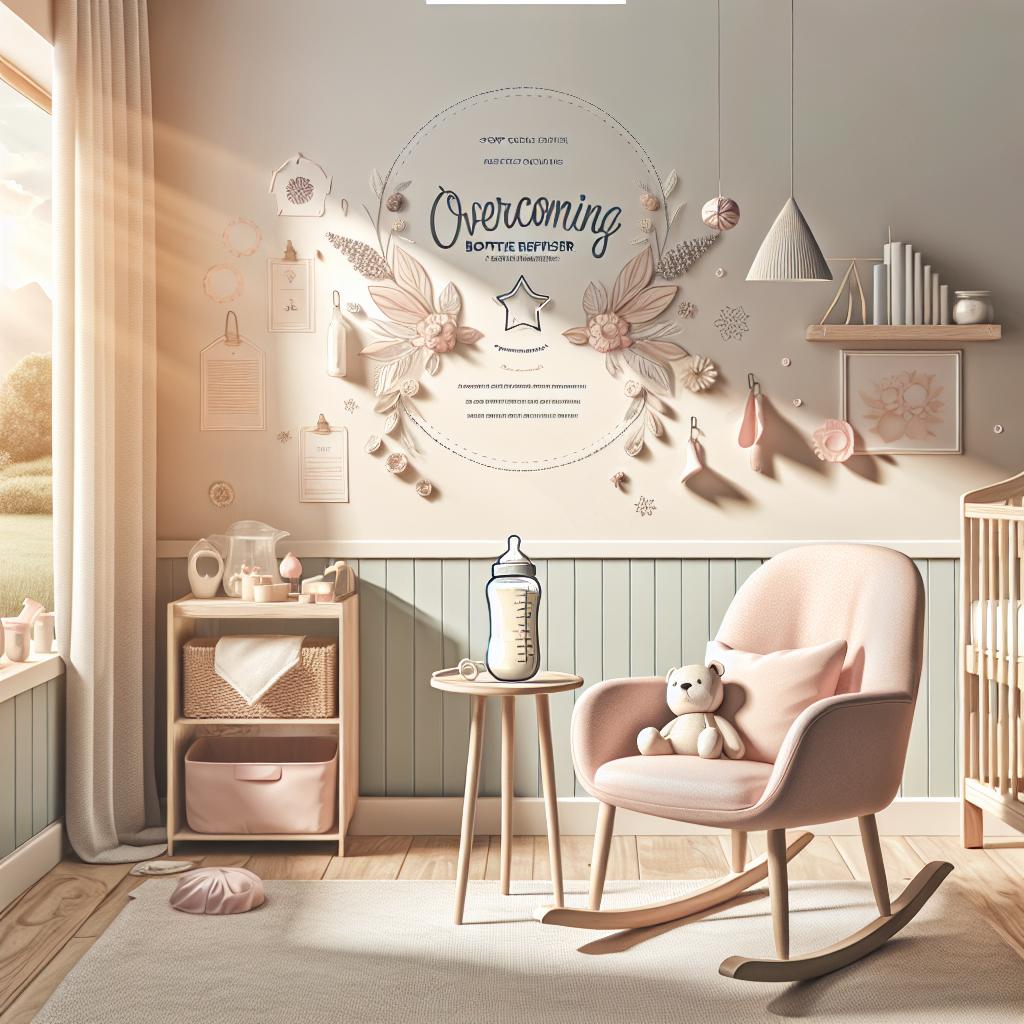Understanding Bottle Refusal
The struggle of overcoming bottle refusal can test the patience of even the most resilient parents. It is a common issue many caregivers face, with their little ones refusing the bottle whether filled with formula or expressed breast milk. While the challenge can be overwhelming, it is crucial to remember that you are not alone in this journey.
The term ‘bottle refusal’ refers to situations where a baby who has been successfully bottle feeding suddenly starts rejecting the bottle. This can occur for various reasons, ranging from teething to illness, changes in the taste or smell of the milk, or a preference for breastfeeding. It is important to identify the cause to find the right refusal solutions.
Methods for Overcoming Bottle Refusal
To stop bottle refusal, it might require a trial-and-error approach. Here are some tried and true strategies:
- Change the bottle or nipple: Sometimes, a simple switch in the type of bottle or nipple can make the transition easier for some babies. There are various types of bottles and nipples on the market that mimic the feel and flow of a mother’s breast.
- Alternate between breast and bottle: Transitioning between breastfeeding and bottle feeding can help your baby get used to the feel and functionality of the bottle. Offering expressed breast milk in the bottle can also aid this process.
- Change the feeding environment: A shift in surroundings can help distract your baby and make them more receptive to taking the bottle. Try feeding in a calm, quiet area at first, then gradually introduce more active environments as your baby gets accustomed to the bottle.
Baby Bottle Tips and Tricks
Besides the above strategies, there are additional baby-friendly bottle feeding tips and tricks that you can try to halt bottle refusal:
- Feeding when baby is calm: Offering a bottle when your baby is relaxed and not too hungry can make them more likely to accept the bottle.
- Trying different temperature milk: Some babies have a preference when it comes to the temperature of their milk. Experiment with warm, room-temperature, and cold milk to see if this makes a difference.
Overcoming Bottle Refusal Hurdles
In your journey to overcoming bottle refusal, never hesitate to ask for help and support. It is essential to consult with your pediatrician or a lactation consultant if you’re struggling, as they can provide expert advice tailored to your unique situation.
Additional resources are also available to you. For instance, this article by The Washington Post provides helpful information and advice to mothers facing bottle refusal issues. You can also take a look at relevant studies and research on the matter to understand more about the scientific perspective behind bottle refusal.
Persistance and patience are key in this journey to stop bottle refusal. Remember, each baby is unique and will transition in their own time and way. As you explore these refusal solutions, make sure to stay positive and supportive of your baby’s progress.
Familiarizing with the Bottle
The process of helping your baby get familiar with the bottle can take time and various approaches. For example, letting your baby play with the bottle to smell, touch, and hold could get them used to its presence before integrating it into their feeding routines. Over time, this exercise can assist in lessening anxiety or resistance that they may associate with a bottle.
Importance of Consistency
Sometimes, inconsistency in feeding methods can create confusion for your baby and lead to bottle refusal. Maintaining a consistent feeding routine and a predictable environment, including comfortable positioning and soothing sounds, can provide reassurance and likely to make them more accepting towards a bottle.
Remember that your baby is accustomed to breastfeeding, so any new feeding methods – including a bottle – will take some adjusting. Patience and consistency can slowly help your baby understand this new way of receiving nourishment.
Community Support
One of the best resources available to new parents is the community of others who are going through, or have gone through, similar experiences. Many NewParents subreddit users share their own tips and stories, providing invaluable peer-to-peer support. Fellow parents can offer a unique and personal perspective on your struggles – no one understands what you are going through like someone who has experienced the same issues firsthand.
Professional Advice
If your child is refusing the bottle for a prolonged period despite your consistent efforts, it might be best to seek the advice of a professional. They can provide insight into possible underlying issues and suggest personalized solutions. A qualified lactation consultant or pediatrician can help guide you through specific challenges and provide scientifically backed advice.
Combating Bottle Refusal Seminars
Websites like Institute for the Advancement of Breastfeeding & Lactation Education offer informative material and conduct workshops on combating bottle refusal. You can learn further about the possible reasons behind bottle refusal and gain knowledge about different feeding techniques to apply that suit your baby’s needs.
Case Studies and Real-life Experiences
You might also find the experience of Rowena insightful, where she has detailed how she overcame severe bottle aversion. Her observation on baby’s bottle behavior and meticulous derivation of solutions could be enlightening.
Another practical guide could be the experience shared on Little Peach Sleep. Here, they narrate their journey of overcoming an extreme feeding aversion, where their baby refused both breast and bottle. The steps they took to resolve this issue can offer you reliable strategies that you can, in turn, use while dealing with bottle refusal.
From professional advice to real-life experiences, there’s a wealth of information and support out there for dealing with bottle refusal more confidently and productively. Remember to trust yourself and your instincts as a parent. Although it may seem like a considerable challenge, with patience, determination, and guidance, this too is a milestone that you and your baby will overcome.

